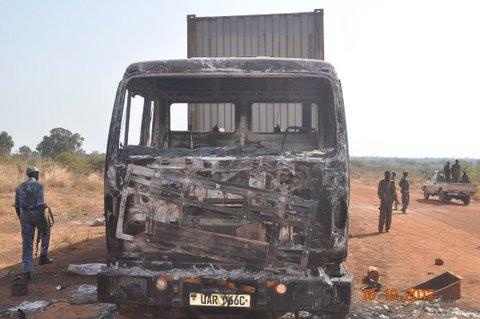Western Bahr el Ghazal police commissioner allegedly fired over handling of violent protests
December 12,2012 (JUBA) – South Sudan’s police authorities on Tuesday claimed the dismissal of Western Bahr el Ghazal police commissioner, Sabit Joseph Makelele, had taken place allegedly for failing to contain violent protests in Wau on Sunday.

According to a former commissioner from the area, 25 people were killed in the protests.
Minister of interior, Alison Manani Magaya confirmed the report but claimed that Makelele has been merely suspended for administrative reasons. “There is a difference between dismissal and suspension. The police commissioner you are talking about has not been dismissed as far I am concern. What I know is that he has been suspended for administrative reasons, which cannot be discussed in the media,” Magaya told Sudan Tribune on Tuesday.
Western Bahr el Ghazal minister of information, who is also spokesperson for the state government, Derik Alfred Uya, also confirmed the reports, saying it is true police commissioner in the state “did not show control” of the situation. “It was unfortunate that this happened while relevant authorities could not show control of the situation,” Uya told Sudan Tribune from Wau.
Uya revealed that of those who died in the demonstration which took place on Sunday morning were eight, six died on the spot in front of the South Sudan Bank and two others died on their way to hospital. He expressed the disappointment and sorrowfulness of the government for the deaths and said clashes occurred because protesters were targeting the prison and the Central Bank branch.
“They were targeting the State Secretariat General with the intention of burning it. They were actually behaving violently. They burned the police camp in Hai Kosti on Saturday, set fire to the house of the head of the criminal investigation department in the state and killed him with his whole family. They killed the bodyguard of the governor before that. The guard was killed the same way they killed the head of the criminal investigation department. He was killed with whole family on the farm of the governor,” Uya explained.
He accused politicians of using innocent civilians as, he claimed, politicians would benefit from the relocation of the county headquarters to the area, stressing those rejecting the transfer of the county headquarters to Bagari, are the “real enemies” of development and stability of not only the state but the whole country. The relocation is what initially instigated the protests.
“Western Bahr el Ghazal is not an independent state. It is part of the central government. So these people must know what they are doing is not trying to destabilise only Western Bahr el Ghazal state, it will be insecurity in the whole country. [… ]And they must understand a problem in one part of the country can be a concern in another part, just like a body with other parts. A pain in one part of the body disturbs the rest of the body,” Uya explained.
He wondered why the police authorities in the state allowed protesters as they did have “documents from the government allowing them to go out for peaceful demonstrations.”
He said the demonstration started in the Jebel Kheir and Kalfario areas on 8 December with the burning of the police camp in Jebel Kheir before spreading to Wau town on 9 December. “They attacked police and burned all their properties in the centre and went off to close the three major roads leading out to Western Bahr el Ghazal, Bagari and Raja. They stopped commercial vehicles and prevented local traders from getting out of their houses to come to the market”, he said
He claimed that protesters burned commercial vehicles coming to the state on the Bussery road from an area called Ngomba. “They burned more than 26 commercials trucks to ashes, burned tyres of trailers and denied 53 trucks entry into the state,” he explained.
(ST)
